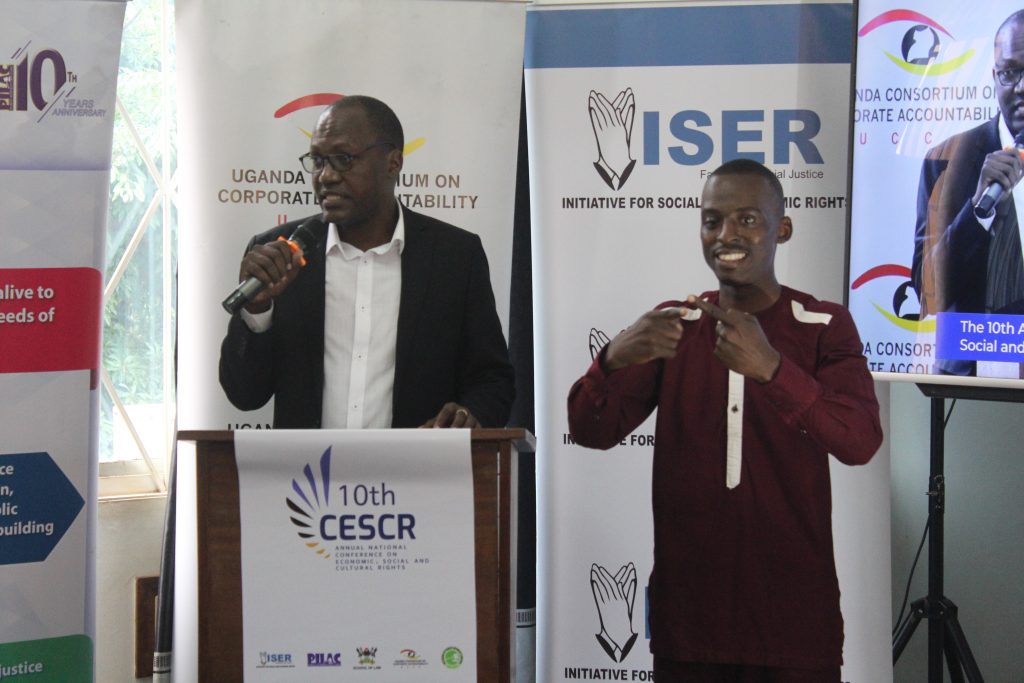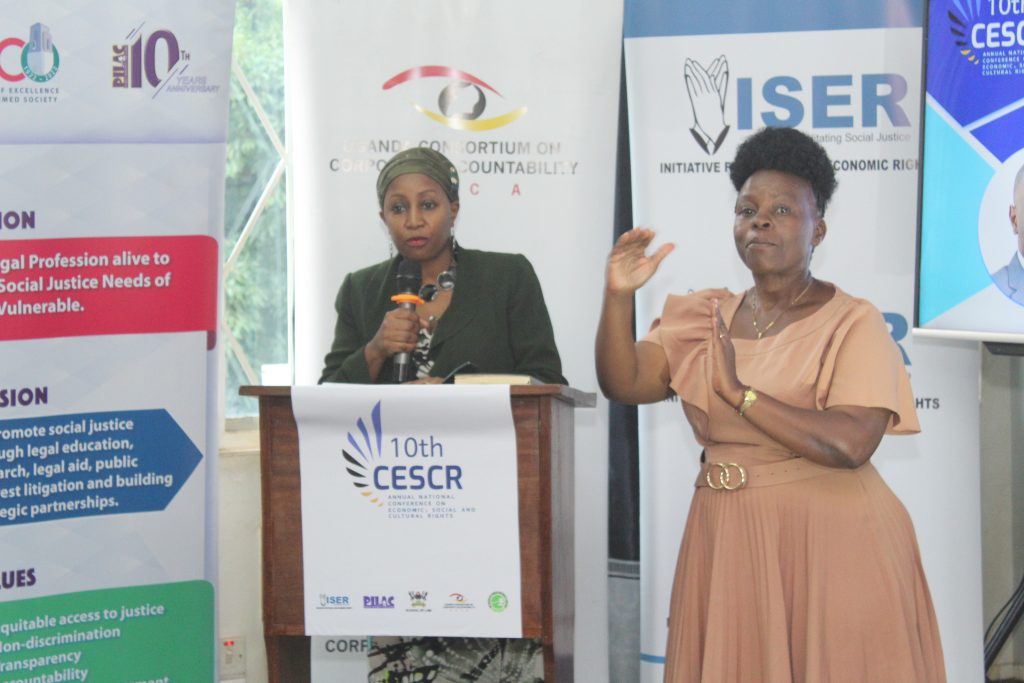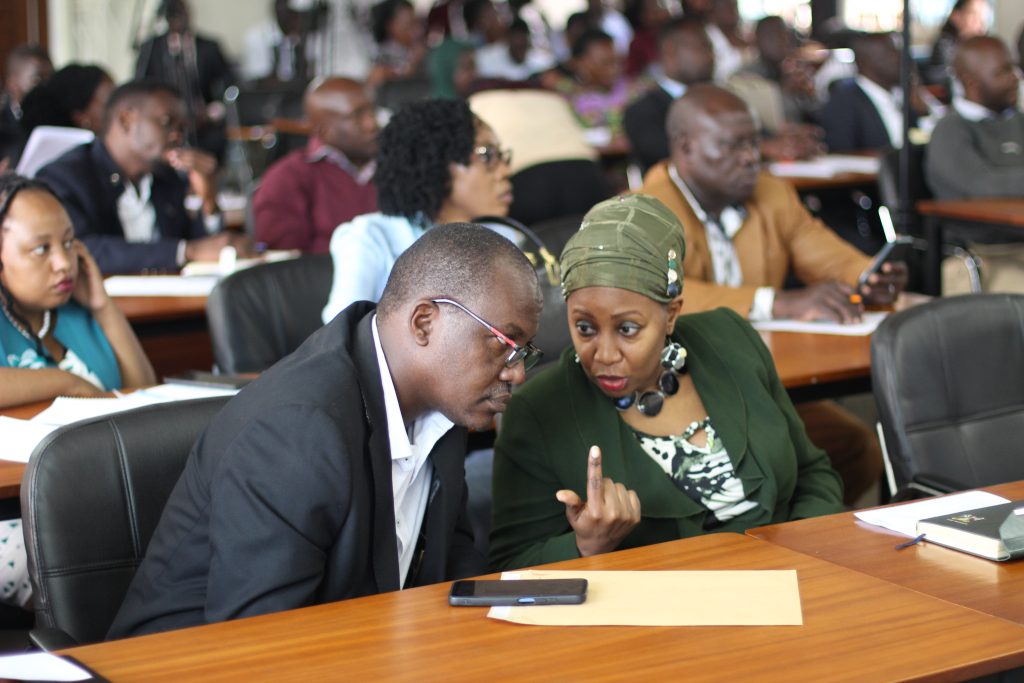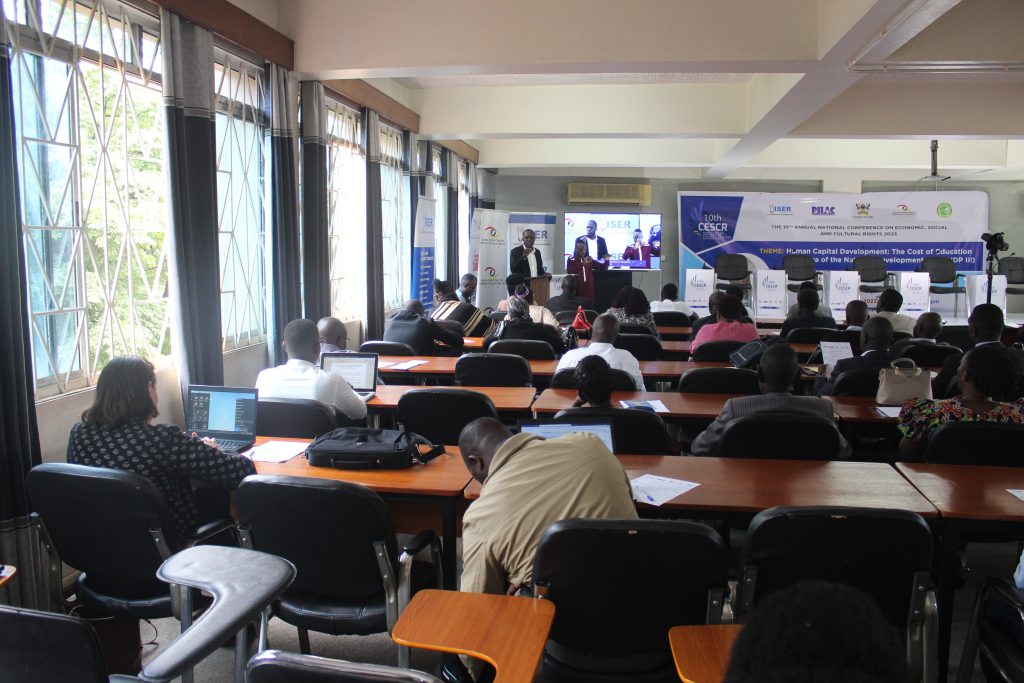The 10th Annual National Conference on Economic, Social & Cultural Rights: Stakeholders call for government intervention to control rising education costs
Stakeholders at the 10th edition of the national conference on economic, social and cultural rights have called on government to intervene in controlling the rising education costs in Uganda. The conference themed, ‘Human Capital Development: The cost of Education in the era of the National Development Plan (NDP III)’ was held on the 14th September 2023 at the Makerere University.
The conference was organised by Makerere University School of Law (SoL) Public Interest Law Clinic (PILAC) in partnership with Initiative for Social and Economic Rights (ISER), Uganda Consortium on Corporate Accountability (UCCA) and Network of Public Interest Lawyers (NETPIL).

Setting the focus of the conference, Professor Christopher Mbazira, Coordinator – PILAC welcomed participants to conference. He reminded them of the various themes handled over the years, noting this year is a celebration looking at the impact and contribution made by the discussions from the previous editions of the conference. He highlighted some of the achievements of the conference: the increased number of participants and networks created; creation of the biggest human rights conference in Uganda; influence on policy formulation like social impact assessment framework developed by the Ministry of Gender Labour & Social Development; National Planning Authority ( NPA) has fully embraced human rights in its planning; empowering litigation for social and economic rights that led development of guidelines for eviction of tenants; more Civil Society Organisations (CSOs) are speaking about human rights ( education, housing, water, food, economic livelihoods etc.) among others.

Professor Mbazira projected what he hopes to see in discussions at the conference in the next 10years:
- Retain the thematic focus of the conference as is or rethink new areas and consider refocusing the title to interrogate the interdependence between social/cultural rights and civil/political rights
- The quality of human resources produced in Uganda as well as the legal environment for workers and social security
- The tragedy of losing skilled and unskilled labour who are migrating out of the country. Canada was highlighted a favourite destination for skilled workers aged 20-35years
- New dawn of the rapid decline of civil and economic rights globally as well as the noted returned of coup de tats on the Africa continent, this affects business chains across other nations
- The recentralizing of services by the government in Uganda as opposed to decentralization approved earlier which affects service delivery
- Addressing the debt burden of Uganda
- Increasing retreat of the state in providing social services which mainly affects vulnerable populations

The Ag. Principal – SoL, Dr. Zahara Nampewo welcome participants to Makerere and School of Law. Dr. Nampewo underlined the importance of providing equal opportunity for all persons by quoting John F. Kennedy, ‘Not everyone has equal abilities but everyone should have equal opportunity’. She added, ‘it is almost impossible to thrive or archive Ubuntu without rights. Human rights have to be enjoyed to achieve the middle income status as outlined in Uganda’s vision 2040’. Dr. Nampewo also highlighted the changing landscape of who accesses quality education as opposed to what was previously possible for persons to come from any part of Uganda and attend the top schools. ‘Research and education contribute to knowledge generation and transformation of societies. This conference is therefore a form of education and I hope everyone has a takeaway from the discussions’, she further said.

She expressed the pleasure to see the stakeholders in the room because all have a role to play. She thanked NPA for the support as well as the partners who work with PILAC and SoL to organise the conference. She added, ‘the days of Makerere as an ivory tower ended and we strive to take knowledge to communities to solve challenges and this helps keep the University as a top institution’.

Professor Henry Alinaitwe, Deputy Vice Chancellor/Finance & Administration – Makerere University officially opened the conference on behalf of the Vice Chancellor, Professor Barnabas Nawangwe who was attending to other official duties.
In his remarks, Professor Alinaitwe congratulated SoL for consistently organising the conference. He thanked government for the conducive environment and support to Makerere University. He reiterated the message of other speakers who had also highlighted the rising cost education, absence of scholarships and bursaries for deserving students which impedes many from accessing education, yet any nation to develop requires skilled human capital.
‘Uganda’s population growth is very high and doesn’t match the projected economic growth targets’, Professor Alinaitwe noted. He called on NPA and government to pick lessons from the Asian nations that have registered high economic growth by controlling population growth alongside requisite skills development for their populations.

Dr. Joseph Muvawala, Executive Director – NPA keynote address was read by Mr. Samuel Kasule, Senior Planner for Education & Skills Development – NPA. Mr. Kasule expressed hearty greetings from Dr. Muvawala and NPA. He thanked the conveners of the conference for providing a platform for this important discourse. He reminded the participants that Uganda’s Vision 2040 stipulates “A transformed Ugandan society from a peasant to a modern and prosperous country within 30 years. This involves changing from a predominantly low income to a competitive upper middle income country within 30 years”.
Highlights of the keynote address included:
- Seven (7) National Plans are expected to deliver the Vision 2040, so far 3 have been formulated (NDP I, NDP II, NDP III). The third National Development Plan (NDPIII, 2020/21 – 2024/25) is the third in a series of six five-year plans, aimed to achieve the Uganda Vision 2040 aspirations. As the NDPIII comes to an end, the next era will be the “Mid-point Plan” of the Uganda Vision 2040.
- Human capital development is fundamental for technological and economic development. The discussion on the Cost of Education in the Era of the National Development Plan III” is very critical especially at the time when the country now needs to accelerate the attainment of key development targets. Government has prioritized investment in human capital to facilitate exploitation of growth opportunities.
- Uganda has to achieve sustained high economic growth rates as a basis for a qualitative leap in an environment where the economy is (i) recovering from the impacts of COVID-19, (ii) facing global inflationary pressures resulting from the on-going Russia-Ukraine war and (iii) in which the fiscal space has been reduced due to debt servicing All the three mentioned impacted on the cost of education.
- How to innovatively improve domestic revenue mobilization efforts to finance human capital development in a resource constrained environment within the short to medium term;
- Reduce poverty, improve incomes and enhance wealth creation among Ugandans in the short, medium and long term;
- Prioritizing value addition
- Consistent investment in human capital is essential for Uganda to achieve its development goals and improve the overall well-being of its citizens. Uganda’s human resource development strategy is anchored on the premise of maximizing the benefits of the demographic dividend. The NDP era has prioritized human resources development in areas of education, skills development, health, water and sanitation among others.
- The discussion of cost of education comes at an important time, especially when we are at cross roads, for financing of education because of the trade-off of financing the different levels of education (like Primary, Secondary and BTVET, among others). Most importantly, this discussion also comes at the time with the trade of the achieving increased access at all levels and quality of education. However, achieving both comes with a greater cost.
- The Iron triangle proposes that the tradeoff among cost, quality, and access is such that improvements in one area (e.g., decreasing costs) make it incredibly difficult, if not impossible, to see improvements in the other two areas (e.g., increasing quality and access). I will therefore further discuss the different theoretical perspectives for cost of education.
- The achievement of targets of the NDP era requires enormous resources. For instance, a policy action where Government is to provide completely free education for primary, secondary and TVET – where government shall provide the required instructional materials, infrastructure and cover school feeding costs increases transition rate over the Vision 2040 period from P7 to S1 from 64% in 2019/20 to 90%; the transition rate to BTVET after P7 increases to 8.2 percent; the transition rate from S4 to BTVET to increase from 3.7 percent to 51.8 percent, below the transition rate for S4 to S5 at 48 percent.
- Strengthen mobilization of resources through the Alumni Bodies. Education institutions should mobilise alumni to help with raising funds for instance for research and to sponsor students’ research at the university and, hence, linking universities and the business community, especially industries
- The discussion on costs of education for higher education must centre around meeting the quality assurance costs for higher education both at the National Council for Higher Education involving provision of adequate financing for quality control and operations; and at the quality control units in higher education institutions.
- Meeting the costs of education requires attaining internal efficiency gains within institutions. As institutions seek more funding, they should mobile resources internally through the following:
- Increasing class sizes, raising student staff ratios, teaching loads;
- Leveraging technology
- Deferring maintenance;
- Substituting lower cost part-time academic staff for higher cost full-time academic staff;
- Restructuring academic programs to drop low priority programs; and
- Outsourcing non- core functions like student catering services, cleaning and security services.
The conference continued through the day with panel discussions and presentations, some the issues raised are captured below:
- Although it’s being cited that the education sector picks a huge chunk of the human capital development budget, if you critically look into the attendant expenditures, you’ll notice a lot of wastage
- All hope is not lost. The government is discussing withdrawing funding from Government aided schools that are charging school fees comparable to private for-profit schools to boost public schools
- The ranking of schools according to performance in will end this year. Under the new curriculum, we are looking at the competence of the learner not UNEB ranking
- Even with a liberalized economy, if cost is not regulated, it will propagate inequalities. The question arose of regulators as actors in the same field. You can’t be an education government official & own private schools
- School fees regulation is a question of equity. Privilege hates equity. When we are privileged we forget about equity’ – Ms. Ruth Ssekindi, Uganda Human Rights Education
- It’s disturbing that science teachers who are paid the most are the ones that don’t show up at work the most. They have frustrated the clock-in system’
- We can’t leave provision of education to the private sector. We need to protect the poor. Government shouldn’t leave the cost of education to be determined by the private sector – regulation is needed.
- Government embarked on a new curriculum for which resources & human capital wasn’t mobilized
- Government should look into introducing earmarked taxes for education to be paid largely by the rich and wealthy




